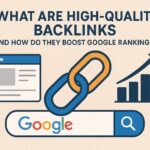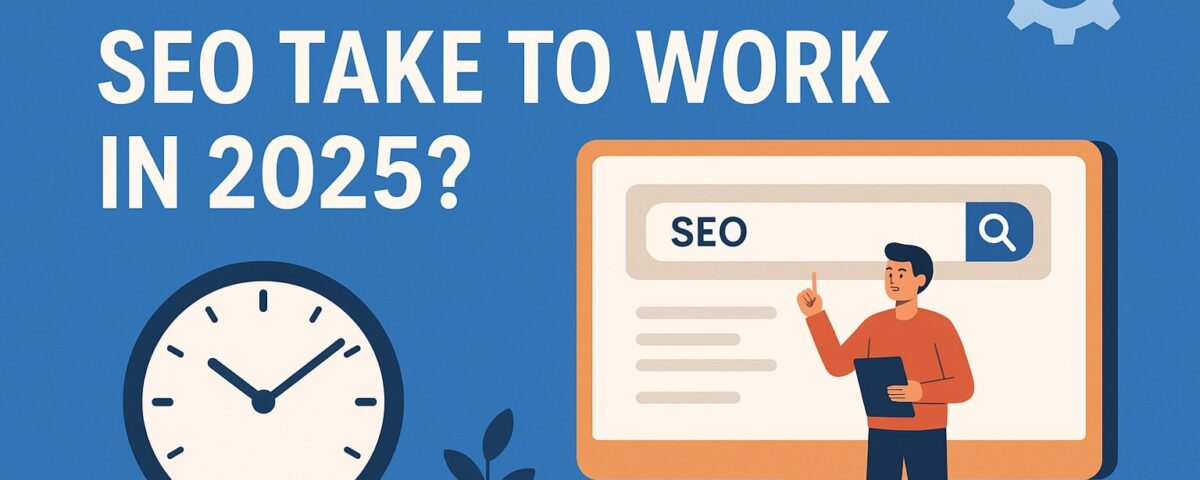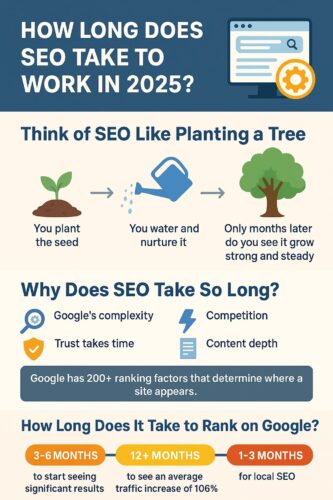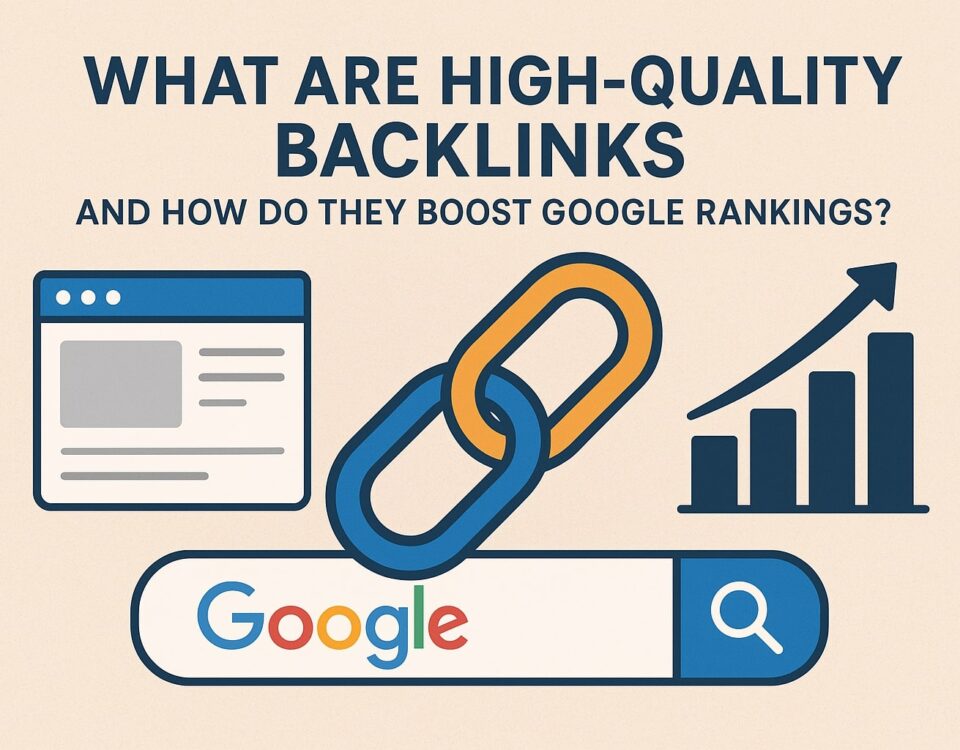
What Are High-Quality Backlinks and How Do They Boost Google Rankings?
August 20, 2025How Long Does SEO Take to Work in 2025?

SEO in 2025 looks very different from what it was 10 years ago, but the core principle is the same: Google rewards websites that provide value, trust, and great user experiences.
Let’s look at what the data says about SEO timelines in practice:
- 74.71% of SEOs believe it takes 3–6 months to start seeing significant results from SEO (Ahrefs, 2023).
- 65% of marketers say SEO is their highest-performing channel for ROI compared to paid ads and social media (Search Engine Journal, 2024).
- Businesses that consistently invest in SEO for 12+ months see an average traffic increase of 106% compared to those who quit early (HubSpot, 2024).
How long does SEO take to work?
The truth? SEO isn’t an overnight fix. It’s a long-term process that needs patience, consistency, and a smart strategy.
Unlike paid ads (which stop working the second you pause your budget), SEO builds a lasting foundation of visibility and trust. Done right, it keeps bringing traffic and leads for years.
On average, SEO Process takes 3 to 12 months to see meaningful results. But let’s break down why it takes that long and what you can do to speed things up.
Why Does SEO Take So Long?
Think of SEO like planting a tree:
- You plant the seed.
- You water and nurture it.
- Only months later do you see it grow strong and steady.
- Google’s complexity: Over 200 ranking factors are in play such as site speed, mobile usability, backlinks, engagement, and more.
- Competition: Niches like finance, health, or e-commerce are crowded with big players.
- Trust takes time: Google doesn’t immediately trust new sites. It wants consistent, high-quality content and backlinks.
- Content depth: Thin, keyword-stuffed posts don’t cut it anymore. In 2025, Google values in-depth, helpful, and mobile-optimized content.

The numbers make it clear why SEO isn’t an overnight game:
- Google has 200+ ranking factors that determine where a site appears (Backlinko, 2024).
- Pages in the top 10 results are on average 2+ years old (Ahrefs, 2023).
- 90.63% of pages get no traffic from Google because they aren’t properly optimized (Ahrefs, 2023).
How Long Does It Take to Optimize a Website?
That depends on where you’re starting:
- New site? You begin from scratch with technical SEO, content strategy, and authority building.
- Existing site? You’ll likely need a full audit to fix issues first.
Key areas to optimize:
- Technical SEO: Fix crawl errors, improve site speed, mobile responsiveness, Core Web Vitals.
- On-page SEO: Title tags, meta descriptions, headers, internal links, keyword mapping.
- User Experience (UX): Easy navigation, clear structure, fast-loading pages.
And remember: SEO isn’t “set it and forget it.” You’ll need regular monitoring, updates, and tweaks as Google evolves.
How Long Does It Take to Rank on Google?
Most websites see results in 3 to 12 months, but timelines vary based on:
- Competition: Ranking for “best credit card” could take years. Ranking for “best coffee shop in Dallas” could take months.
- Domain age: Older, trusted domains move faster.
- Content quality: Engaging, comprehensive content beats thin posts.
- Backlinks: The more high-quality links, the faster you build authority.
Pro tip: Long-tail keywords rank faster. For example:
- “Best running shoes for flat feet 2025” may take weeks.
- “Best running shoes” may take years.
How to Get SEO Results Faster
While you can’t hack Google, you can speed things up with smart moves:
- Fix technical issues such as site speed and mobile-friendliness.
- Target low-competition, long-tail keywords.
- Build quality backlinks through guest posts, industry mentions, and PR.
- Combine SEO with paid ads and social media for early traction.
- Think of ads as the fuel that jump-starts your SEO engine.
Studies consistently show the strong link between backlinks and rankings:
- Websites with strong backlink profiles rank significantly faster than those without (Backlinko, 2024).
- The top-ranking page on Google has an average of 3.8x more backlinks than pages in positions 2–10 (Ahrefs, 2023).
The Role of AI & Automation in SEO (2025)
AI is everywhere in SEO now, both helping marketers and powering Google’s algorithms.
- For businesses: AI tools suggest keywords, analyze competitors, create outlines, and optimize meta tags. Huge time-saver.
- For search engines: Google uses AI-driven features like SGE (Search Generative Experience) to deliver AI-powered summaries.
But here’s the catch:
- AI can’t replace human expertise.
- Google values E-E-A-T (Experience, Expertise, Authoritativeness, Trust).
- Automated content without authenticity is risky.
The winning formula in 2025 is AI efficiency combined with human expertise.
Here’s how AI is shaping SEO according to recent reports:
- 66% of marketers now use AI tools to speed up SEO workflows like keyword research, content writing, and competitor analysis (HubSpot, 2024).
- Google’s Search Generative Experience (SGE) is influencing 30–40% of search queries, making AI-optimized content crucial (Search Engine Land, 2025).
Local SEO vs. National/Global SEO Timelines
Not all SEO campaigns move at the same pace:
- Local SEO (faster):
- Ranking factors: proximity, reviews, relevance.
- With a good Google Business Profile and reviews, you could see results in 1 to 3 months.
- Ranking factors: proximity, reviews, relevance.
- National/Global SEO (slower):
- Broader competition.
- Can take 12 to 24 months to dominate high-value keywords.
- Broader competition.
If you’re a local café, expect quick wins. If you’re building a global e-commerce brand, gear up for the long game.
When you compare the data, it’s easy to see why local SEO moves faster:
- Local SEO results can appear within 1–3 months if the Google Business Profile is optimized (BrightLocal, 2024).
- 46% of all Google searches have local intent (Google, 2024).
- For national/global SEO, dominant rankings often take 12–24 months depending on competition (Moz, 2024).
What Mistakes That Delay SEO Results
Want to avoid wasting months? Steer clear of these:
- Keyword stuffing or over-optimization.
- Ignoring technical SEO (slow sites, broken links, poor Core Web Vitals).
- Creating content for search engines, not people.
- Posting inconsistently.
- Giving up too early (SEO compounds over time).
How to Measure SEO Progress While You Wait
SEO progress isn’t just “page 1 rankings.” Track these early wins:
- Impressions (rising visibility).
- Keyword movement (going from page 10 to 3).
- Organic traffic growth (even 5 to 10% monthly is solid).
- Bounce rate and dwell time (better engagement means better rankings).
- Backlinks earned (authority boost).
- Think of SEO like the gym. You don’t see abs in a week, but small progress such as strength, stamina, and energy shows you’re on track.
Here are some stats that show how consistent effort pays off in SEO:
- Sites that publish 16+ blog posts per month see 3.5x more traffic than those publishing less than 4 (HubSpot, 2024).
- Updating old blog content can increase organic traffic by 106% (Backlinko, 2024).
The Future of SEO Timelines Beyond 2025
Will SEO ever be instant? Probably not, but things are evolving:
- Faster indexing through IndexNow and real-time crawling.
- Predictive AI analytics to shorten testing cycles.
- Branding as a ranking factor, since strong brands climb faster.
The takeaway: SEO won’t be instant, but businesses that embrace AI, branding, and smart strategies will see results faster than laggards.
Conclusion
So, how long does SEO take in 2025?
- Most businesses: 3 to 12 months.
- Local SEO: 1 to 3 months.
- National or global campaigns: 12 to 24 months.
SEO is a long-term investment, but one that keeps paying dividends long after paid ads stop.
Think of it like planting seeds. With consistent effort, those seeds grow into a tree that provides shade (traffic, leads, and sales) for years to come.
Start today, stay consistent, and trust the process.
FAQs
- Can SEO work in less than 3 months?
Yes, for low-competition keywords or local businesses with authority. - Does domain age matter?
Definitely. Older, trusted sites often rank faster. - Should I ever stop SEO?
No. SEO is ongoing. Even small efforts compound over time. - Is SEO still better than paid ads in 2025?
Yes. Ads give instant traffic but disappear when you stop spending. SEO builds long-term visibility. - What’s the fastest way to get organic traffic?
Target long-tail keywords, optimize Google Business Profile, publish high-quality content, and promote it on social channels.



